裕兴新概念英语第二册笔记_第55课
- 格式:pdf
- 大小:462.22 KB
- 文档页数:10
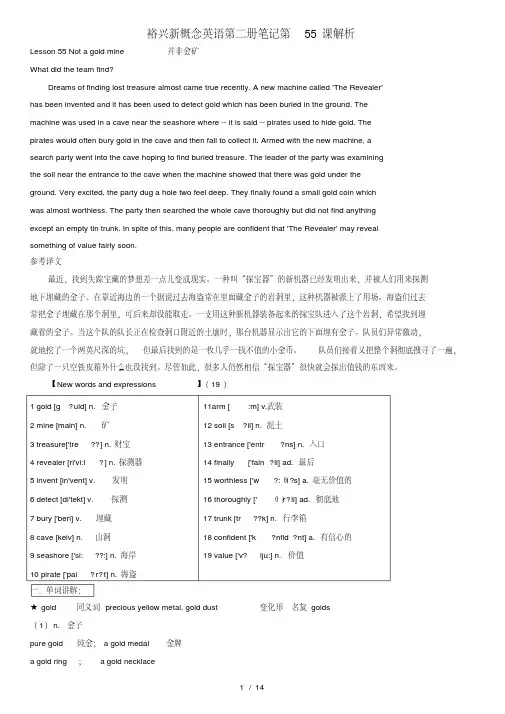
Lesson 55 Not a gold mine 并非金矿What did the team find?Dreams of finding lost treasure almost came true recently. A new machine called 'The Revealer'has been invented and it has been used to detect gold which has been buried in the ground. Themachine was used in a cave near the seashore where -- it is said -- pirates used to hide gold. Thepirates would often bury gold in the cave and then fail to collect it. Armed with the new machine, asearch party went into the cave hoping to find buried treasure. The leader of the party was examiningthe soil near the entrance to the cave when the machine showed that there was gold under theground. Very excited, the party dug a hole two feel deep. They finally found a small gold coin whichwas almost worthless. The party then searched the whole cave thoroughly but did not find anythingexcept an empty tin trunk. In spite of this, many people are confident that 'The Revealer' may revealsomething of value fairly soon.参考译文最近,找到失踪宝藏的梦想差一点儿变成现实。
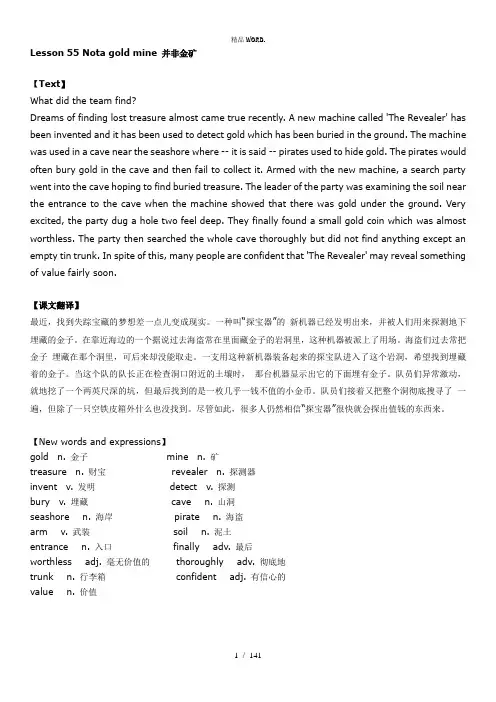
Lesson 55 Nota gold mine 并非金矿【Text】What did the team find?Dreams of finding lost treasure almost came true recently. A new machine called 'The Revealer' has been invented and it has been used to detect gold which has been buried in the ground. The machine was used in a cave near the seashore where -- it is said -- pirates used to hide gold. The pirates would often bury gold in the cave and then fail to collect it. Armed with the new machine, a search party went into the cave hoping to find buried treasure. The leader of the party was examining the soil near the entrance to the cave when the machine showed that there was gold under the ground. Very excited, the party dug a hole two feel deep. They finally found a small gold coin which was almost worthless. The party then searched the whole cave thoroughly but did not find anything except an empty tin trunk. In spite of this, many people are confident that 'The Revealer' may reveal something of value fairly soon.【课文翻译】最近,找到失踪宝藏的梦想差一点儿变成现实。
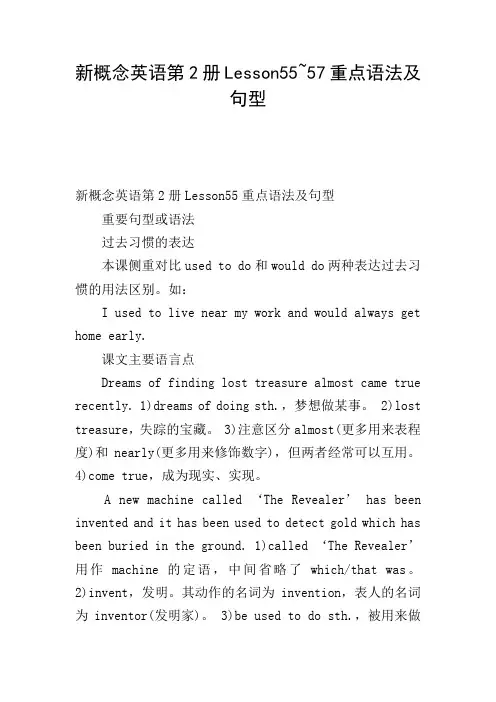
新概念英语第2册Lesson55~57重点语法及句型新概念英语第2册Lesson55重点语法及句型重要句型或语法过去习惯的表达本课侧重对比used to do和would do两种表达过去习惯的用法区别。
如:I used to live near my work and would always get home early.课文主要语言点Dreams of finding lost treasure almost came true recently. 1)dreams of doing sth.,梦想做某事。
2)lost treasure,失踪的宝藏。
3)注意区分almost(更多用来表程度)和nearly(更多用来修饰数字),但两者经常可以互用。
4)come true,成为现实、实现。
A new machine called ‘The Revealer’ has been invented and it has been used to detect gold which has been buried in the ground. 1)called ‘The Revealer’用作machine的定语,中间省略了which/that was。
2)invent,发明。
其动作的名词为invention,表人的名词为inventor(发明家)。
3)be used to do sth.,被用来做某事。
4)detect,探测。
5)bury,埋藏。
The machine was used in a cave near the seashore where - it is said - pirates used to hide gold. 1)注意对比句中的was used in a cave(表被动)和used to hide(表过去习惯)的区别。
2)破折号中的it is said作为插入语,强调整句话只是据说如何如何,不一定是事实。
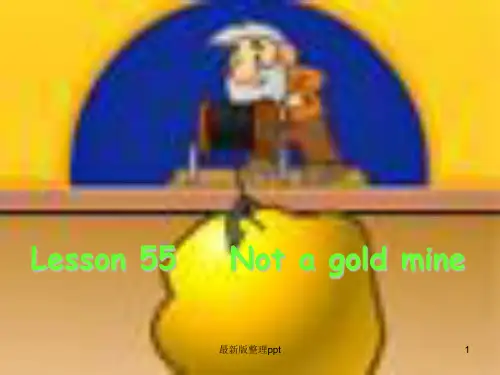
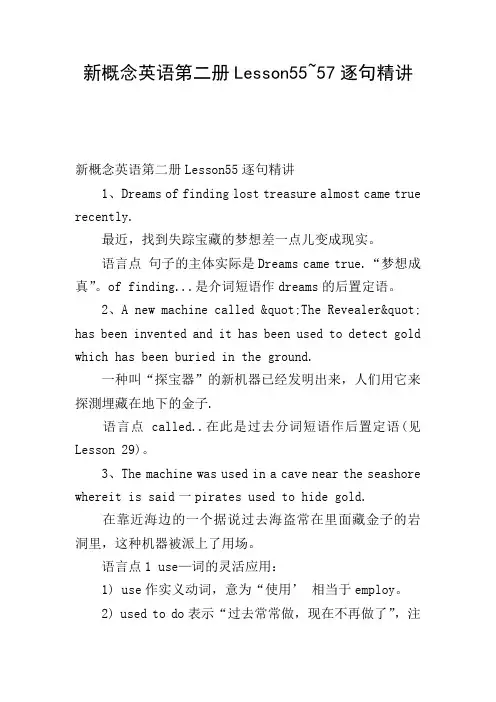
新概念英语第二册Lesson55~57逐句精讲新概念英语第二册Lesson55逐句精讲1、Dreams of finding lost treasure almost came true recently.最近,找到失踪宝藏的梦想差一点儿变成现实。
语言点句子的主体实际是Dreams came true.“梦想成真”。
of finding...是介词短语作dreams的后置定语。
2、A new machine called "The Revealer" has been invented and it has been used to detect gold which has been buried in the ground.一种叫“探宝器”的新机器已经发明出来,人们用它来探測埋藏在地下的金子.语言点 called..在此是过去分词短语作后置定语(见Lesson 29)。
3、The machine was used in a cave near the seashore whereit is said一pirates used to hide gold.在靠近海边的一个据说过去海盗常在里面藏金子的岩洞里,这种机器被派上了用场。
语言点1 use—词的灵活应用:1) use作实义动词,意为“使用’相当于employ。
2) used to do表示“过去常常做,现在不再做了”,注意,此结构加动词原形。
例:I used to swim every day when I was a child.孩提时代,我每天去游泳。
used to没有人称和数的变化,例:She /1 / They used to do …3) be used to doing = be accustomed to doing 习惯于做某事这里的be是系动词,used是形容词,to是介词,后接名词或动名词。
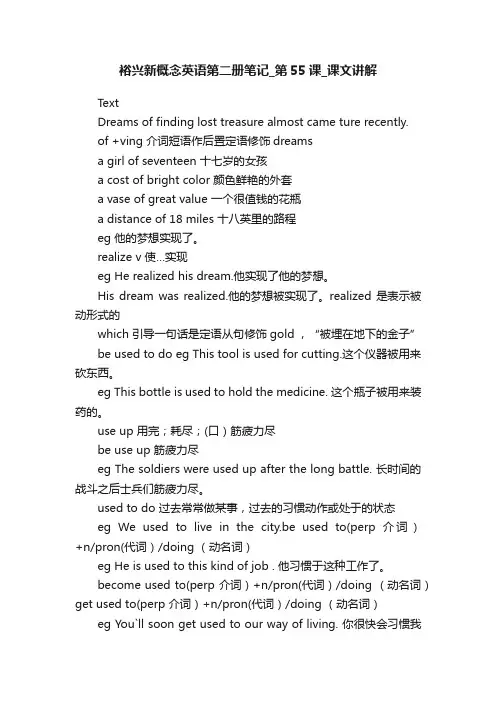
裕兴新概念英语第二册笔记_第55课_课文讲解TextDreams of finding lost treasure almost came ture recently.of +ving 介词短语作后置定语修饰dreamsa girl of seventeen 十七岁的女孩a cost of bright color 颜色鲜艳的外套a vase of great value 一个很值钱的花瓶a distance of 18 miles 十八英里的路程eg 他的梦想实现了。
realize v 使…实现eg He realized his dream.他实现了他的梦想。
His dream was realized.他的梦想被实现了。
realized 是表示被动形式的which 引导一句话是定语从句修饰gold ,“被埋在地下的金子”be used to do eg This tool is used for cutting.这个仪器被用来砍东西。
eg This bottle is used to hold the medicine. 这个瓶子被用来装药的。
use up 用完;耗尽;(口)筋疲力尽be use up 筋疲力尽eg The soldiers were used up after the long battle. 长时间的战斗之后士兵们筋疲力尽。
used to do 过去常常做某事,过去的习惯动作或处于的状态eg We used to live in the city.be used to(perp 介词)+n/pron(代词)/doing (动名词)eg He is used to this kind of job . 他习惯于这种工作了。
become used to(perp 介词)+n/pron(代词)/doing (动名词)get used to(perp 介词)+n/pron(代词)/doing (动名词)eg You`ll soon get used to our way of living. 你很快会习惯我们的生活呢方式的eg I`m used to staying up late. 我习惯于熬夜了。
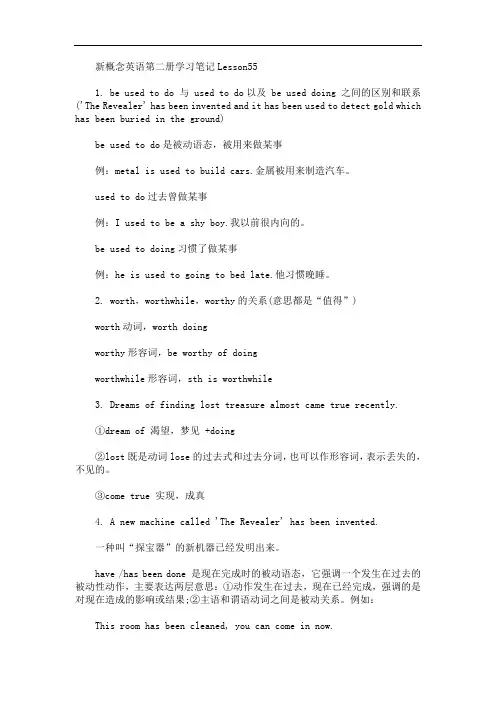
新概念英语第二册学习笔记Lesson551. be used to do 与 used to do以及 be used doing 之间的区别和联系('The Revealer' has been invented and it has been used to detect gold which has been buried in the ground)be used to do是被动语态,被用来做某事例:metal is used to build cars.金属被用来制造汽车。
used to do过去曾做某事例:I used to be a shy boy.我以前很内向的。
be used to doing习惯了做某事例:he is used to going to bed late.他习惯晚睡。
2. worth,worthwhile,worthy的关系(意思都是“值得”)worth动词,worth doingworthy形容词,be worthy of doingworthwhile形容词,sth is worthwhile3. Dreams of finding lost treasure almost came true recently.①dream of 渴望,梦见 +doing②lost既是动词lose的过去式和过去分词,也可以作形容词,表示丢失的,不见的。
③come true 实现,成真4. A new machine called 'The Revealer' has been invented.一种叫“探宝器”的新机器已经发明出来。
have /has been done 是现在完成时的被动语态,它强调一个发生在过去的被动性动作,主要表达两层意思:①动作发生在过去,现在已经完成,强调的是对现在造成的影响或结果;②主语和谓语动词之间是被动关系。
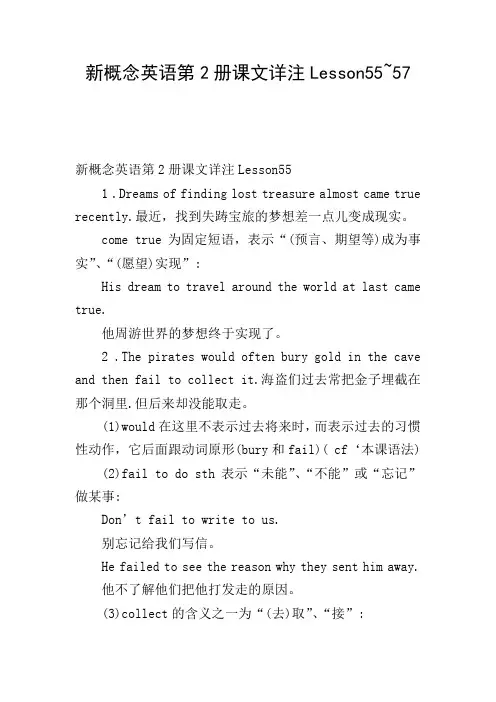
新概念英语第2册课文详注Lesson55~57新概念英语第2册课文详注Lesson551 .Dreams of finding lost treasure almost came true recently.最近,找到失踌宝旅的梦想差一点儿变成现实。
come true为固定短语,表示“(预言、期望等)成为事实”、“(愿望)实现”:His dream to travel around the world at last came true.他周游世界的梦想终于实现了。
2 .The pirates would often bury gold in the cave and then fail to collect it.海盗们过去常把金子埋截在那个洞里.但后来却没能取走。
(1)would在这里不表示过去将来时,而表示过去的习惯性动作,它后面跟动词原形(bury和fail)( cf‘本课语法)(2)fail to do sth表示“未能”、“不能”或“忘记”做某事:Don’t fail to write to us.别忘记给我们写信。
He failed to see the reason why they sent him away.他不了解他们把他打发走的原因。
(3)collect的含义之一为“(去)取”、“接”:I’ll collect my post on my way home.我将在回家时顺路取我的邮件。
Don’t fail to collect me before you go to the party.去参加晚会之前别忘了接我。
3. Armed with the new machine…用这种新机器装备起来...arm(ed) with可以表示“带着”、“装着”、“穿着”等: Don’t worry.I’m armed with an umbrella.别担心,我带着伞呢。
You’d better arm yourself with a warm coat.你穿件暖和的外衣。
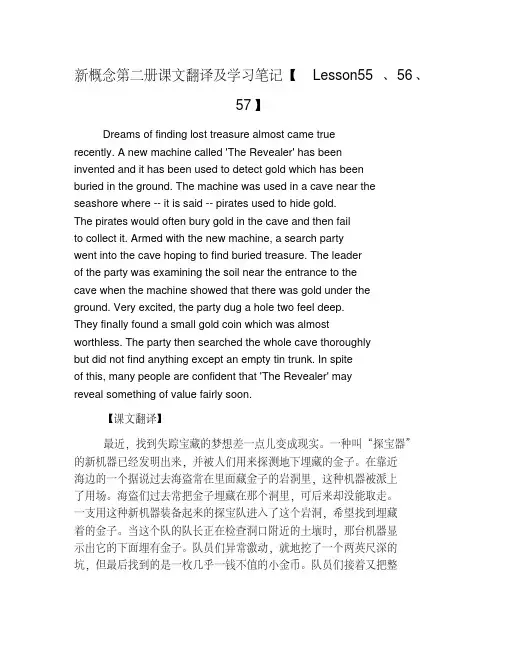
新概念第二册课文翻译及学习笔记【Lesson55、56、57】Dreams of finding lost treasure almost came truerecently. A new machine called 'The Revealer' has beeninvented and it has been used to detect gold which has beenburied in the ground. The machine was used in a cave near the seashore where -- it is said -- pirates used to hide gold.The pirates would often bury gold in the cave and then failto collect it. Armed with the new machine, a search partywent into the cave hoping to find buried treasure. The leaderof the party was examining the soil near the entrance to thecave when the machine showed that there was gold under theground. Very excited, the party dug a hole two feel deep.They finally found a small gold coin which was almostworthless. The party then searched the whole cave thoroughlybut did not find anything except an empty tin trunk. In spiteof this, many people are confident that 'The Revealer' mayreveal something of value fairly soon.【课文翻译】最近,找到失踪宝藏的梦想差一点儿变成现实。
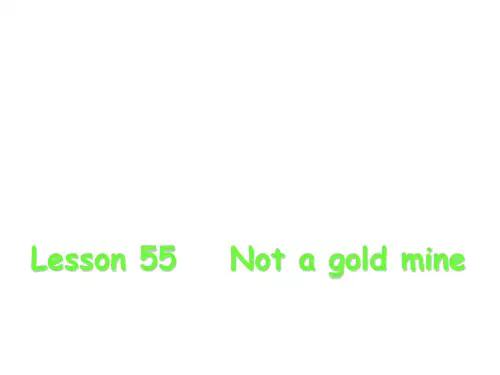
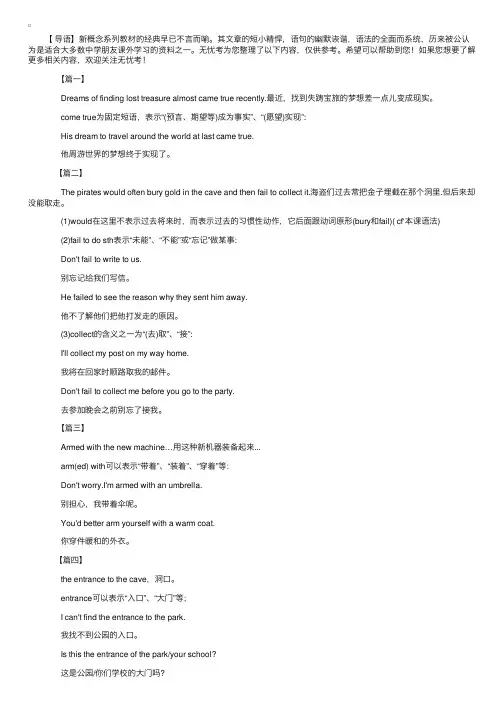
【导语】新概念系列教材的经典早已不⾔⽽喻。
其⽂章的短⼩精悍,语句的幽默诙谐,语法的全⾯⽽系统,历来被公认为是适合⼤多数中学朋友课外学习的资料之⼀。
⽆忧考为您整理了以下内容,仅供参考。
希望可以帮助到您!如果您想要了解更多相关内容,欢迎关注⽆忧考!【篇⼀】 Dreams of finding lost treasure almost came true recently.最近,找到失踌宝旅的梦想差⼀点⼉变成现实。
come true为固定短语,表⽰“(预⾔、期望等)成为事实”、“(愿望)实现”: His dream to travel around the world at last came true. 他周游世界的梦想终于实现了。
【篇⼆】 The pirates would often bury gold in the cave and then fail to collect it.海盗们过去常把⾦⼦埋截在那个洞⾥.但后来却没能取⾛。
(1)would在这⾥不表⽰过去将来时,⽽表⽰过去的习惯性动作,它后⾯跟动词原形(bury和fail)( cf‘本课语法) (2)fail to do sth表⽰“未能”、“不能”或“忘记”做某事: Don't fail to write to us. 别忘记给我们写信。
He failed to see the reason why they sent him away. 他不了解他们把他打发⾛的原因。
(3)collect的含义之⼀为“(去)取”、“接”: I'll collect my post on my way home. 我将在回家时顺路取我的邮件。
Don't fail to collect me before you go to the party. 去参加晚会之前别忘了接我。
【篇三】 Armed with the new machine…⽤这种新机器装备起来... arm(ed) with可以表⽰“带着”、“装着”、“穿着”等: Don't worry.I'm armed with an umbrella. 别担⼼,我带着伞呢。
新概念英语第二册课堂笔记:第55课lesson 55gold n 金子mine n 矿treasure n 财宝revealer n 探测器invent v 发明detect v 探测bury v 埋藏cave n 山洞seashore n 海岸pirate n 海盗arm v 武装soil n 泥土entrance n 入口finally adv 最后worthless adj 毫无价值的thoroughly adv 彻底地trunk n 行李箱confident n 有信心的value n 价值gold/goldensth be made of gold由金子做成的gold watch 、gold ringgolden sum金色的太阳Silence is golden沉默是金golden:金色的,宝贵的golden opportunity宝贵的机会golden sentence黄金句型i am glad to have the golden opportunity to stay with you gold fish金鱼all......it not不是所有的all that glitters is not gold部分否定 not allplatinum白金treasure island金银岛jewel珠宝,(可数)jewelry珠宝(总称,不可数)people/police/cattle(总称)diamond钻石jade碧玉reveal揭示hold one's armFarewell!Arms永别了,武器Soldiers should be armed well士兵应该要很好的武装the youth should be armed with knowledgebe covered withthe teacher should be patientthe teacher should be armed with patienceearth泥土soil土壤entrance of/entrance tocompletely/thoroughly/totallybe confident of doing sthbe confident thattextDreams of finding lost treasure almostcame true recently. A new machine called'The Revealer' has been invented and ithas been used to detect gold which hasbeen buried in the ground. The machinewas used in a cave near the sea-shore。
新概念英语第二册Lesson55~57单词学习新概念英语第二册Lesson55单词学习dismay[dɪs'meɪ] V失望.泄气gold [gəʊld] n.金子mess[mes]乱七八糟【单词搭配】ina mess -团糟【派生词】golden金的【单词例句】The gold necklace is very elegant.这条金项链非常精致。
【单词搭配】gold necklace佥项链mine [maɪn] 矿treasure ['treʒə] 财宝【派生词】treasurer财务主管【单词扩充】riches财富【单词例句】A:If you find the treasure,we will go shares. A:如果你找到那批财宝,咱们平分。
B:It's a deal.B:就这么定了。
revealer [ri'vi:lə] 探测器invent [ɪn'vent] V发明【派生词】invention发明【单词扩充】contrive发明【单词例句】A: Do you know who invented this object? A:你知道这是谁发明的吗?B:I don't know that.B:我不知道。
detect [dɪ'tekt] V探测bury ['berɪ] v埋藏【单词例句】A: Diga pit and bury the box.A:挖一个坑把这个盒子埋了。
B:I don't think it's safe, either.B:我觉得这样也不安全。
cave [keɪv] 山漏seashore ['siːʃɔː(r)] 海岸【单词例句】A: The pirate ship will catch up with us soon. A:海盗船马上就要追上我们了。
B: What should we do then?B:那我们应该怎么办呢?arm [ɑːm] V武装soil[sɒɪl] 泥土entrance ['entr(ə)ns] n. A口【单词扩充】 intake入口【单词搭配】the enterance to 入口处【单词例句】A: The entrance to the theater is over there. A:刷院的入口在那边。
【导语】新概念英语作为⼀套世界闻名的英语教程,以其全新的教学理念,有趣的课⽂内容和全⾯的技能训练,深受⼴⼤英语学习者的欢迎和喜爱。
为了⽅便同学们的学习,⽆忧考为⼤家整理了⾯的新概念第⼆册课⽂翻译及学习笔记,希望为⼤家的新概念英语学习提供帮助!Lesson55 Dreams of finding lost treasure almost came true recently. A new machine called 'The Revealer' has been invented and it has been used to detect gold which has been buried in the ground. The machine was used in a cave near the seashore where -- it is said -- pirates used to hide gold. The pirates would often bury gold in the cave and then fail to collect it. Armed with the new machine, a search party went into the cave hoping to find buried treasure. The leader of the party was examining the soil near the entrance to the cave when the machine showed that there was gold under the ground. Very excited, the party dug a hole two feel deep. They finally found a small gold coin which was almost worthless. The party then searched the whole cave thoroughly but did not find anything except an empty tin trunk. In spite of this, many people are confident that 'The Revealer' may reveal something of value fairly soon. 【课⽂翻译】 最近,找到失踪宝藏的梦想差⼀点⼉变成现实。
Lesson 55 Nota gold mine 并非金矿【Text】What did the team find?Dreams of finding lost treasure almost came true recently. A new machine called 'The Revealer' has been invented and it has been used to detect gold which has been buried in the ground. The machine was used in a cave near the seashore where -- it is said -- pirates used to hide gold. The pirates would often bury gold in the cave and then fail to collect it. Armed with the new machine, a search party went into the cave hoping to find buried treasure. The leader of the party was examining the soil near the entrance to the cave when the machine showed that there was gold under the ground. Very excited, the party dug a hole two feel deep. They finally found a small gold coin which was almost worthless. The party then searched the whole cave thoroughly but did not find anything except an empty tin trunk. In spite of this, many people are confident that 'The Revealer' may reveal something of value fairly soon.【课文翻译】最近,找到失踪宝藏的梦想差一点儿变成现实。
11-08-2013gold n 金子mine n 矿treasure n 财宝revealer n 探测器invent v 发明detect v 探测bury v 埋藏cave v 山洞seashore n 海岸pirate n 海盗arm v 武装soil n 泥土entrance n 入口finally adv 最后worthless adj 毫无价值的thoroughly adv 彻底地trunk n 行李箱confident adj 有信心的value n 价值gold 1n 金子pure gold 纯金a gold medal 一枚金牌a gold ring 一枚金戒指a gold necklace 一条金项链a gold watch 一块金表a gold mine 一座金矿a golsfish 一条金鱼Pay in gold 用金币付款egAll that glitters is not gold.闪光的不都是金子(外表好不见得真的好)2n a voice of gold 金嗓子golden adj a golden opportunity 一个绝好的机会,良机golden days (一生中的)幸福时光egSpeech is silver; silence is golden.(谚)雄辩是银,沉默是金silver n 银子a silver coin 一枚银币silvery adj 银白色silver gray adj 银灰色mine 1我的egShe is a firend of mine .她是我的一个朋友。
2n 矿a coal-mine 一个煤矿a gold-mine 一个金矿a mine worker/miner 一个矿工3egHe is a mine of information about the political situation of that country. 他非常熟悉该国的政情。
eg mineral adj 矿的,矿泉的,跟矿有关系的mineral water 矿泉水a mineral spring 矿泉treasure 1n 金银财宝,财富(gold,silver,jewel,etc)[c]/[u]buried treasure 埋藏的宝藏thetreasure of the wrecked ship 遇难船上的宝物2n a national treasure 国宝art treasure 艺术珍品Lesson 55Not a gold mine New words and expressions 有价之物,高贵(物主代词)可单独使用金的,金色的,贵重如黄金的,幸运的,珍贵的gold 做定语(名词)修饰其他名词贵重物品(知识等的)资源丰富3nmy dearest treasure 我的宝贝儿4v cherish sb`s friendship/treasure sb`s friendship 珍视某人的友谊treasure sth up in one`s heart 把某事铭记于心reveal v reveal sth to sb(bring sth to light) 把某事透露,揭露,暴露reveal secret 泄露秘密reveal details 披露详情reveal methods 透露方法reveal faults 揭露错误reveal feelings 流露感情egShe revealed the secret to her boyfriend. 她把秘密透露给她的男朋友了。
egThe truth will be revealed someday. 总有一天会真相大白的。
reveal that (从句)egResearch revealed that the bird was on the brink of extinction.研究报告显示,那种鸟已濒临绝迹.revealing adj 揭露(事实真相的);暴露真相的revealing remarks 揭露真相的评论revealing dress 坦胸漏肩的连衣裙revealer n invent v egeginvent a new teaching method 发明一种全新的教学法inventor n invention n discover v 发现egI`ve discovered a super restaurant near here .我在附近找到一个非常好的餐馆。
discovery n detect v egThe device can detect smoke. 这种装置能够探测烟雾egA machine was used to detect gold. 一种仪器被使用来探测金子。
was used (被动语态)被用来egThe police detected the identity of the murderer.警方查出了谋杀犯的身份detection n detector n detective n bury v 1egThe mean landlord asked to be buried with his treasure.这个吝啬的财主要求被和他的财宝埋在一起。
ask to do 要求做某事ask to be buried 要求被埋葬 be buried (被动语态)被埋葬egHe was buried with his wife. 他被和他的妻子合葬。
2buried treasure 埋藏的宝藏egThe house was buried under ten feet of snow. 房子被埋在十英尺一下的积雪中。
egShe buried her face in her hands and wept. 她用手捂住脸哭了起来。
buried one`s head in the sand/hide one`s head in the sand 逃避现实(把头埋于沙子里)bury oneself in sth 埋头于,专心致志于egcave n eg Bears often hibernate in caves.熊总在山洞里冬眠。
cave dweller (美口)(都市的)公寓居民cavity n 腔,洞(身体器官上的,如牙齿上的洞)hole n seashore n a small house on the seashore 海边的一个小房子seasick adj get seasick/become seasick 晕船晕船的洞,孔,坑,洞穴,窟窿海岸,海边(shore)In the evenings, he buries himself in his books.在晚上,他总是埋头于看书。
洞穴,洞窟埋藏于地下探测,发现,察觉,诊查探测器侦探(将尸体)埋葬(buried--buried) 发明,创造发现,探索发现(不好的事物)查出,探测发明,创造Who invented the ball-point pen? 是谁发明了圆珠笔?在发明物前要加定冠词the,表示一类物Bell invented the telephone.Bell 发明了电话。
发明家探测器透露,泄露,揭露(口语)宝贝的人,宝贝珍视,珍爱carsick adj 晕车的homesick adj 想家的seaside 1n 海边游憩地egWe will spend the vacation at the seaside . 我们将在海边度过假期。
2adj a seaside town 海边的城镇pirate 1n a pirate ship 海盗船a pirate flag 海盗旗corsair n 2n 盗版,盗印(可做定语,修饰另一个名词)a pirate video 盗版录像带a pirate tape 盗版录音带3v 非法复制及出售唱片,影片,书籍…smuggle v 走私(手表,毒品,香烟…)run v 走私者在国与国之间运送枪支,毒品及其它违禁危险品bootleg v 非法运送,制造及出售货物(尤指酒)pirate v 非法复制及出售唱片,影片,书籍…arm 1n 手臂arm in arm 臂挽着臂shoulder to shoulder 肩并肩的hand in hand 手拉着手armchair n egShe threw her arms around his neck.她伸出手臂抱住他的脖子。
egShe held her baby in her arms.她怀抱着婴儿。
stretch one`s arms 张开双臂raise one`s arms 高举双臂swing one`s arms 转动双臂2v arm sb with sth/ equip sb with weapons 用…来武装某人armed forces 武装力量(指一国的陆海空三军)armed to the teeth 全副武装(武装到了牙齿)egsoil n 1(近义词 ground;earth)plow the soil 耕种土地rich soil 沃土poor soil 贫瘠的土壤2one`s native soil 祖国egHe died on Irish soil.他死于爱尔兰。
entrance n 1入口(反义词 exit)egWhere is the entrance to the park, please? 请问公园入口在哪里?entrance to……的入口the front entrance of a school 学校的正门入口the back entrance of a school 学校的正门入口2入学entrance into collage/entrance to collage 进入大学entrance examination 入学考试finally adv 最后地final adj 最后的last 仅表示顺序的最后,final 表示一连串事情的终了。
final preparations before leaving 出发前的最后准备eg What`s the final word of this dictionary ? 这本字典的最后一个词是那个词?final decision 最终决定final goal 最终目标the final ballot 最后的选举投票finals n take the finals 参加期末考试土地,土壤(单座)沙发期末考试土地,国家(史)海盗船只武装,装备He armed himself against the cold with warm cost. 他穿一件非常厚的外套来抵御严寒。